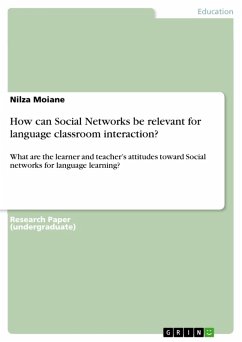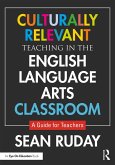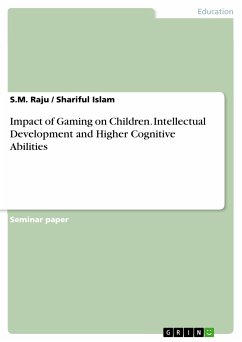Research Paper (undergraduate) from the year 2017 in the subject Pedagogy - Miscellaneous Topics, grade: 14, , language: English, abstract: One of the longstanding problems in language acquisition is to have excellent level of language classroom interaction. Recent developments in this issue suggest that interaction must not exist only in the classroom and the learners must be given the opportunity to use the target language in different situations. Therefore, the present study aims at suggesting, identifying and describing tools in Social Network Sites that can foster Language Classroom Interaction. Given the sense of freedom and autonomy in building network of interaction embedded in social media, actually, Social Network Sites such as Facebook, Gmail, YouTube, Twitter and Instagram are authentic resources and platforms to empower language classroom interaction if the sharing tools within are properly incorporated in a language class. In addition, Social Network Sites shape tools for life when comes to learn in the classroom and outside the classroom, because it presents tools that capacity learner in all aspects: cognitive, interactive and cooperative, and not forgetting learning skills. Furthermore, both learners and teachers, in Mozambican secondary schools have profiles in, at least, one of these Social Network Sites. The study shows that they generally access such sites for entertainment and sharing and never for learning. Among different reasons, lack of knowledge about the learning tools within social networks and low creativity and innovation in teaching are decisive to low exploitability of the tools. The research consists of both qualitative and quantitative methods and the data result from observations, questionnaires and interviews techniques set in Social Network Sites, especially Facebook to bring reliable and verifiable samples of the data analyzed. The research demonstrates how relevant the Social Network Sites are for Language Classroom Interaction and language acquisition. Furthermore, an awareness of these tools can possibly be significant to educational contexts to encourage language learners to interact and collaborate with each other and with native speakers of the target language through a number of online communication tools such as chat walls, videos conference, etc., provided by these platforms.
Dieser Download kann aus rechtlichen Gründen nur mit Rechnungsadresse in A, B, BG, CY, CZ, D, DK, EW, E, FIN, F, GR, HR, H, IRL, I, LT, L, LR, M, NL, PL, P, R, S, SLO, SK ausgeliefert werden.









